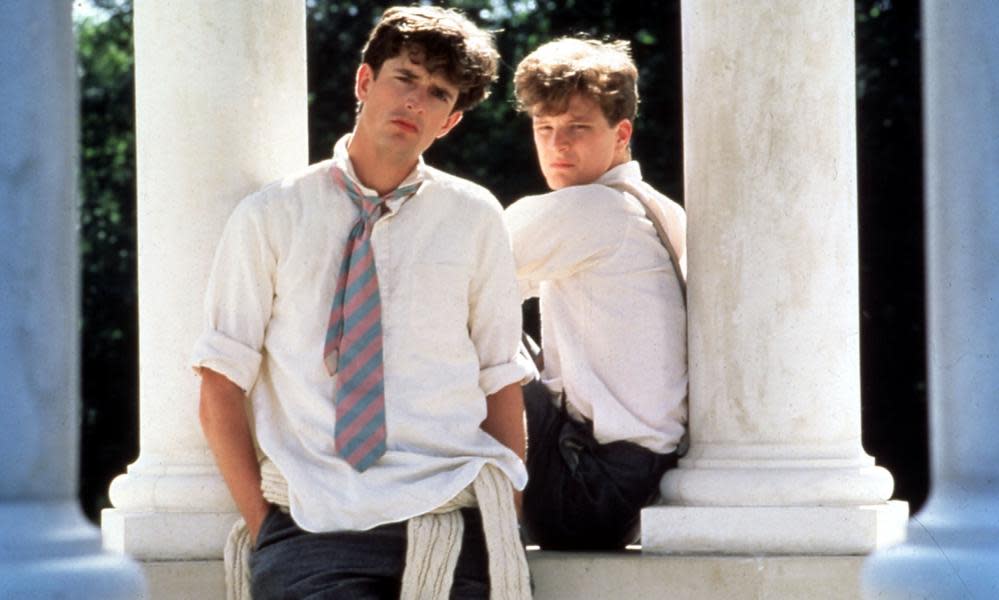What 40 years of celebrity interviews taught me about attitudes towards gay men

Michael Grandage’s film My Policeman, which has just finished filming in Brighton, tells the story of a married couple in a loving and enduring menage a trois. The third party is the husband’s male lover.
The adaptation of Bethan Roberts’ novel covers a period in recent English history – stretching from the 1950s to the 90s – when attitudes to homosexuality underwent significant change. What was once illegal, and supposedly scorned by right-thinking members of society, became accepted to the extent that, in 2014, same-sex marriage was recognised in law.
That Rupert Everett should play the titular policeman’s lover in later life is poignant as the actor, now 62, had to live through the tail end of the often painful journey towards greater enlightenment. In the 1980s, after the film Another Country made him a star, Everett had to contend with sly digs about his sexuality in Nigel Dempster’s Daily Mail diary. It wasn’t until 1995 that the actor finally felt able to confirm what had become an open secret, in an interview with the Daily Express.
Young gay men may now wonder why it took him so long but, while homosexuality may have been decriminalised in 1967, attitudes didn’t change overnight. Everett himself made the point to me that few, if any, of his contemporaries felt able to be honest about their sexuality until they had first established themselves. He feels, looking back, that his openness about his sexuality had an impact on his career: he blames not filmgoers, largely oblivious to actors’ private lives, but risk-averse studio executives who could never, for instance, have countenanced him in a role as overtly heterosexual as James Bond.
Looking back at the celebrity interviews I have conducted over almost 40 years, it makes me wonder if the public were ever quite as obsessive – and puritanical – about the sex lives of stars as some newspapers. It’s depressing how actors such as Richard Chamberlain and Antony Sher asked their PRs to tell me on no account to inquire about their private lives. Both have since come out and found contentment, but Chamberlain would, in his Dr Kildare days, get himself photographed with women; and Sher went so far as to get married to one. Making such a fuss about not talking about his private life was, as Sher now wryly accepts, like “putting a gigantic neon sign over my head saying ‘This guy is gay’”.
It’s hard to blame either actor for being defensive, as the Aids epidemic had, in the 1980s, not engendered sympathy towards gay men from the tabloids, only more hostility. Liberace and Rock Hudson were afforded neither privacy nor dignity in their final days as they were dying of the so-called gay plague. Piers Morgan, then an ambitious young reporter on the Sun, wrote an article calling for EastEnders to be banned after it dared to show “yuppie poofs” kissing. He has since apologised.
It was against this backdrop that I knocked on the door of Harry Andrews – tough guy star of The Hill and The Red Beret – at his home in the Sussex countryside. He seldom granted interviews and his private life had never been subjected to any media scrutiny. So, when he agreed to talk to me for the local paper, I faced a moral dilemma when his long-term lover, Basil Hoskins – who’d appeared with him in Ice Cold in Alex – came to open it.
Looking back, I think Andrews, then 73, had decided to come out: he dwelt in the interview on how he’d wanted to make “a point” with the gay role he played in Entertaining Mr Sloane. It was as if he was willing me to ask the obvious question, but instinctively I resiled. Andrews was about to take a starring role in the hit show Dynasty, and I knew exactly what papers like the Sun would do to him – and Hoskins – even if he didn’t.
There were others, of course, who got through those times by living their supposedly scandalous lives in plain sight. John Schlesinger, who made Sunday Bloody Sunday in 1971, never bothered going through with a conventional marriage, as his fellow director Tony Richardson had. I met him in 1991 when, midway through the interview, he got up and gave a male house guest who was leaving a kiss. He told me that even back then, signing an open letter defending Ian McKellen – for accepting a knighthood from a Conservative government that had recently introduced section 28 – was considered a big deal. “I could hear a particular sound in my head the morning it was published,” Schlesinger told me, grinning. “It was teacups clinking disdainfully on saucers in Cheltenham as little old ladies said to each other ‘My dear, it’s so unnecessary’.”
Psychologists talk airily of how shame always requires punishment – almost as if it’s a process some gay men have to work through – and LGBT rights campaigners may today say that not being open about sexuality amounts to cowardice, which holds back the cause of equality. It’s too easy, however, to judge with hindsight. Each of the actors I spoke to found his own modus vivendi. What’s not in question is that the tabloids and some politicians had made these relatively recent years a distinctly hostile environment for gay people.
Andrews was, incidentally, able to come out on his own terms and posthumously. He died in 1989; and when, 16 years later, Hoskins followed him, it turned out Andrews had left instructions that he be buried alongside him in the graveyard at St Mary the Virgin in Salehurst, East Sussex.
• Tim Walker is a journalist and author. Star Turns, his anthology of interviews, is published this month (SunRise)

 Yahoo News
Yahoo News 
